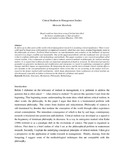Critical Realism in Management Studies
Date
2006-09Author
Marobela, M.
Publisher
Botswana Journal of Business, Faculty of Business, University of BotswanaType
ArticleMetadata
Show full item recordAbstract
In Africa as in other parts of the world critical management research is assuming a lot of significance. There is now a felt need to break away with positivist or empiricist research, which has over years assumed hegemonic status in the philosophy of science. Positivist blind insistence on experimentation and causality as the hallmark of rigorous research is no longer credible and sustainable. One of the apparent problems with the traditional view of research is that it conflates philosophy with methodology and methods. This paper examines a new research paradigm called critical realism. A key component of realism is that it embeds research methods in philosophy, for realism ontology matters. It is argued that realism provides an important metaphysical depth to research. Its theoretical perspective grounded on generative mechanism and stratification and emergence is crucial in explaining contemporary global changes and their impact on organisations. By integrating the macro and the micro domain critical realism offers a new dynamic in the conceptualisation of management where events that we see occurring at the surface level are traced to the deeper unobservable mechanisms, which shape phenomenon. Some weaknesses of critical realism are also discussed, especially its failure to historicise the dialectics of labour and capital.

